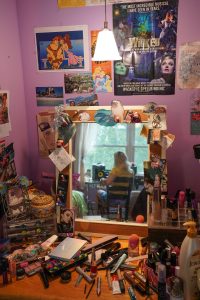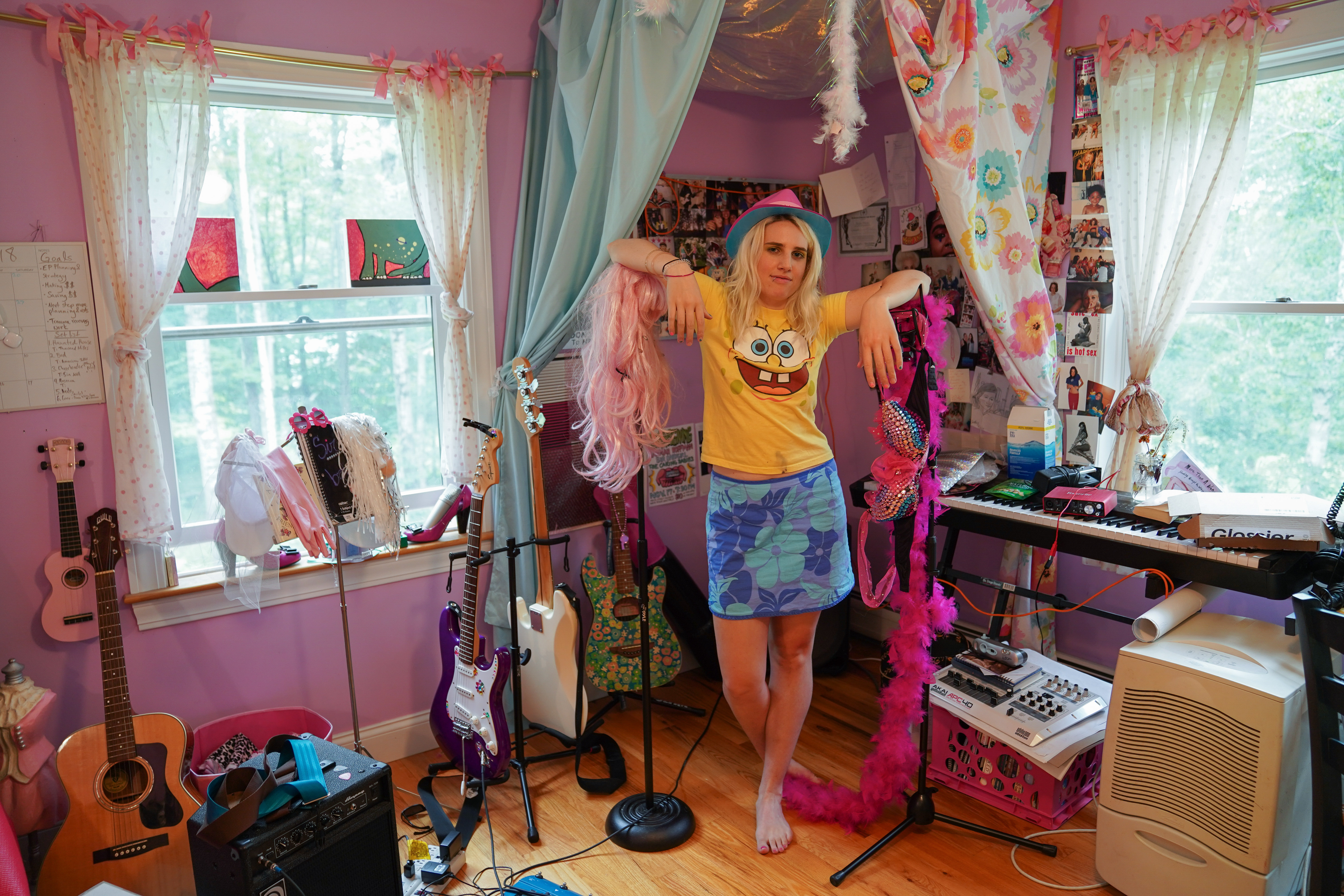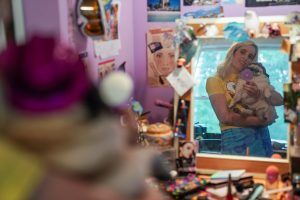Rising Pop Star Sir Babygirl On Her Rural New England Roots
It’s late July in a tiny venue, in a small town, in Vermont. This is an odd space. The walls are lined with strange artifacts and curiosities, including a canning jar that holds Elvis’ gallstones. Or so the label says. It’s the type of place where outcasts and misfits feel right at home. Tonight’s performer is no exception. It’s Kelsie Hogue, a.k.a. Sir Babygirl. She’s wearing a backwards bubblegum pink ball cap and shiny silk robe. She cradles the mic close to her mouth. Her lips are painted cornflower blue—the same as her eye shadow.
This isn’t the type of performer you might expect to see in rural New England. But Hogue’s been here for the past year since she moved back in with her parents.
“This is my childhood bedroom, and I guess it still is, ’cause I’m still a child and it’s still a bedroom,” Hogue explains as she shows off the space, which is half bedroom, half music studio. The lavender walls are covered in ticket stubs, musical theater flyers, photos of female pop idols, awkward middle school portraits. There are instruments, everywhere: “We’ve got an acoustic guitar. We have an electric guitar, which I’ve bedazzled. My first instrument was alto saxophone, because of Lisa Simpson. And then bass, because I wanted to play ‘Maxwell’s Silver Hammer.'”
Hogue took up singing as a teenager and dreamed of becoming a Broadway star. She studied theater in Boston, but that didn’t work out. So she moved to Chicago to be a stand-up comic. That didn’t work out either. Then she got fired from her job and sunk into depression. But, out of these failures, she wrote a song, called “Heels.” It’s super catchy. She posted it on Soundcloud and Instagram. Lots of people liked it, including her family back in New Hampshire.
“I got a call from my brother one day, and he was just like, ‘you should move home. You need to do your music.’ And I was like, ‘I think you’re right.'”
At that point, she realized she really did want to make music, but didn’t have the money or support to do it in the city. So she moved back home. She set up this studio and taught herself how to record and produce her own tracks. The style is a mixture of musical theater, absurdist comedy, and pop.
“I wanna be addicted to my own songs. That’s my goal, when I write my songs, is I want them to be, you have to play it again, have to play it again. It’s bubblegum pop. You have to chew on the bubblegum. And then, when it loses its flavor, you put another piece in.”
But the songs are more than empty calories. For Hogue, they’re an expression of her identity as a nonbinary, bisexual person: “I identify with being a girl, but I also identify with being a boy. I feel like I am a girl and a boy. So I use she/hers/her as my pronouns, so like, ‘Sir Babygirl, she’s over there.’ Or I use they/them/their, so like, ‘Sir Babygirl, they’re over there.’ Or, I’ve started using he/him/his, ‘Sir Babygirl, he’s over there.’ And just like, for me, literally each pronoun feels affirming.”
You can hear these themes in many of her songs, like the tracks “Flirting with Her,” “Pink Lite,” and “Cheerleader.”
“I’m just obsessed with gender extremes, and gender expression extremes, so I love that cheerleaders are extremely feminine and extremely masculine.”
For the record, there were no cheerleaders at her high school. Still, the teenage experience looms large in Hogue’s music.
“I feel like I’m going back and queering my growing up experience. I wasn’t out. I didn’t even know I could be.”
And in high school, Hogue could see her peers every day. Now, it’s not so easy. Most of her friends have moved away. She’s isolated.
“That was something that I knew, going into moving back here for a year, that’s the sacrifice I’m going to make. I’m not gonna have a traditional social life of someone in their twenties.”
So she goes online, where she’s built an active following on Instagram. She’s shared her music there, which actually caught the attention of an indie label. Now Hogue has a deal with Father/Daughter Records. It’s a huge step, but still no guarantee that she’ll be a star. So she keeps hustling.
“All I want to do now is just play live and tour it and tour it and tour it, and be around humans again.”
And she has another dream: “Honestly, I really want backup dancers. It’s not a joke. This is not a drill. I really want two backup dancers.”
One of her biggest supporters is Matt Mazur. He’s booked her at a few local shows. He’s seen hundreds of artists play here, but when he saw Sir Babygirl take the stage for the first time, she stood out. “You can really tell that Kelsie wanted to make that leap and has been putting a lot of time and effort into preparing for that. It’s so magic to see it happen,” says Mazur.
Hannah Hoffman, a performer and Hogue’s close friend since high school added, “It seems like she’s inspiring a lot of people to be who they are and be okay with that. I mean it’s hard enough to just exist as a human, so it’s really cool to have somebody to help you feel like what you’re doing and who you are is justified and important.”
Back at the show, Sir Babygirl is on stage in her pink hat and blue lipstick. Before her final song, she makes a big announcement: “I am moving to Brooklyn in a month. Come find me.”
Tonight, in front a few dozen people in small-town Vermont, Sir Babygirl is still dreaming of becoming a queer pop idol. But, in just a few months, she’ll play for packed crowds at the country’s biggest music showcase, SXSW, with two backup dancers by her side.
Music included in this piece: “Heels,” “Cheerleader“





